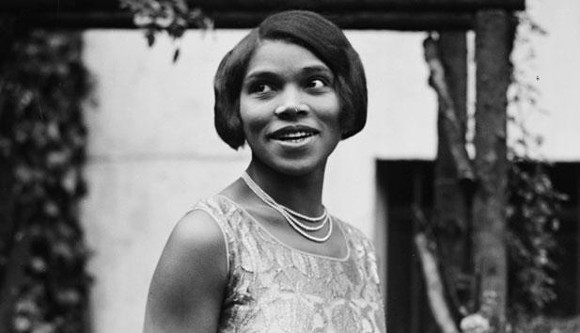
Marian Anderson was a highly renowned classical singer who became the first African American to perform at the Metropolitan Opera. She was born on February 27, 1897 to John and Annie Anderson in Philadelphia, Pennsylvania. Her father ran an ice and coal business and his mother was a babysitter. She came from a devout Christian family, and her earliest exposure to music was through the Union Baptist Church in South Philadelphia. Her family recognized her vocal talents and encouraged her to sing and perform. They bought her a piano but could not afford to pay for lessons, so Marian taught herself to play and joined the church choir at the age of six. Her aunt Mary was also a choir singer, and she encouraged her niece by taking her along to performances at church, the YMCA and any other benefits and community events. Marian was paid 25 cents for her performances as a child, which increased to $5 by the time she was a teenager.
As her exposure and interest in music grew, Marian became more confident as a performer. Her father died in a mining accident when she was 12, so the family moved in with her grandparents. Her grandfather had been a slave who had been emancipated in the 1860s, and Marian was very close to him. She attended Stanton Grammar School, from where she graduated in 1912. She could not afford formal lessons, but joined various groups such as the Baptists’ Young People’s Union and the Camp Fire Girls where she got opportunities to develop her talents. She attended South Philadelphia High School, from which she graduated in 1921.
She was denied admission to the Philadelphia Music Academy due to racial segregation, but this left her undaunted. She took private lessons with the noted teacher Giuseppe Boghetti, for whom she auditioned and he was duly impressed and agreed to take her on as a student. She received immense support from the Philadelphia black community, who raised funds for her to be able to continue her musical education. In 1925, she won the first prize in a singing competition sponsored by the New York Philharmonic and was given the opportunity to perform in concert with the orchestra. During this time, she was managed by Arthur Judson. This performance led the way for several others. In 1928, she performed at Carnegie Hall, and then decided to embark on a tour of Europe.
Her performances in Europe were received eagerly. Free from the racial prejudice prevalent in the US, she toured several countries, and partnered with various artists. She worked with a Russian concert organizer named Sol Hurok, who became her manager for the rest of her career. She returned to the US, where she made her first appearance in New York at Town Hall. Despite being offered several opera roles, she turned them down as she had no training in or interest in acting. However, she did record a number of opera arias. She performed throughout the US, but unfortunately was still denied entry at some venues due to racial barriers. One such incident occurred in 1939, where she was denied entry to perform at the Constitution Hall. The incident sparked a lot of controversy, and the First Lady Eleanor Roosovelt protested the decision and the National Association for the Advancement of Colored People joined in as well. Eventually, Marian performed at an open air concert in front of a crowd of 75,000 people on the steps of the Lincoln Memorial, where President Roosevelt himself was in attendance.
Marian Anderson’s life and career were remarkable, and she was honored with the Presidential Medal of Freedom by President Kennedy. In 1991, she received a Grammy Award for Lifetime Achievement. She spent the final years of her life in Oregon, where she died in 1993 at the age of 96.
